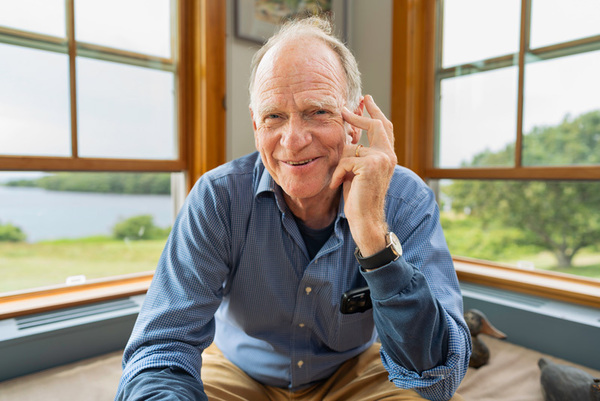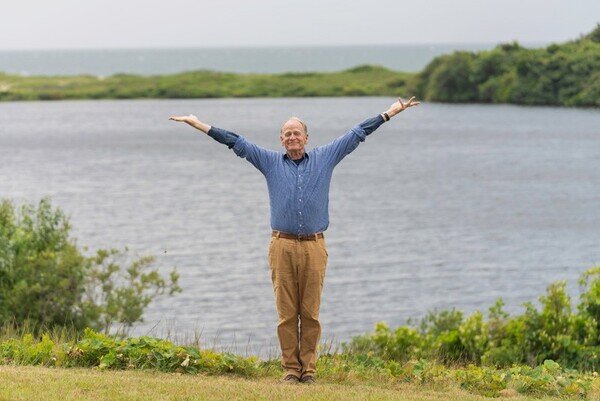News, Reviews, Interviews & More
Livingston Taylor: Words and music
Tuesday, August 6, 2024
By Abby Remer

Photography by Jeremy Driesen
Singer, songwriter, teacher, performer, and supreme raconteur Livingston Taylor does it all. The latter makes him enthralling to see on stage and a delight to interview.
Like all busy Vineyarders, we begin our conversation by noting how this summer just has to be the craziest to date. With this out of our system, we turn to the business at hand, his upcoming performance at the M.V. Film Center on Thursday, August 15, at 7:30 pm.
With such a long and successful career under your belt, what compels you to keep performing?
Oh, my goodness, because I keep getting better and having new ideas and new things I want to show people. At 73, I come to this with a skill set hammered out of 55 years of doing it.
Although I am mindful to perform a smattering of old stuff, I’m particularly enthusiastic about doing not only an occasional new song but other songs that I find that are just so beautifully written.
Music finds us all the time. It can be in a shopping mall, the person pulling up in a car next to me with their windows open, seeing a television commercial and then investigating who wrote the music and what else they have done, or hearing it on an oldie station.
People, in general, are looking for the familiar in an unexpected location. It’s one of the great problems of logarithmic music programming. Generally, an arbitrator plays what you want until you get secure and safe and then pokes with something that’s unexpected and demands you listen to it because you’re going to like it.
Logarithmic programming can’t do that. So, don’t worry. If you come to see Livingston Taylor, these will be my choices, and they will always be interesting.
Where do the ideas for your work keep coming from?
If I knew, I would go to that place, live there full time, and then tell others where that place is.
It just shows up sometimes, and it’s a delight when it does. It doesn’t appear as often for me at 73 as it did when I was 26 or 34. But when it does show up, it’s really better because I’m so much better at knowing what good is.
Does the music come separately or simultaneously with the lyrics when creating new songs?
In the best ones, the music and lyrics show up together. Or I will have written a melody, and then because it is so pleasant to me, I can repeat it over and over and start writing a storyline around it. You know, if you have a really good plot line, then this will tumble out of me, and all you need is a hook to get in — the first couple of sentences, and then you are on your way.
Do you curate your shows, plan what you will play beforehand, or approach it more improvisationally?
The show is improvisational. There are a few things I know I’m likely to play. But that’s not a slam dunk. What exists is a moment in time and space that will be me on a stage at 7:30 at night, and I get to that intersection, and then you incorporate the variables that exist at that moment and start in on the show.
It’s not dissimilar to getting to an intersection in Edgartown. Are you going to go or stop? I don’t know. I’m not there yet. Are you worried about it? Absolutely not. I’ve done this many times before, and I’m sure I will stop, go slowly, or fast. I will make those decisions when I get there, but I have many options. That’s what the performance is for me.
You often perform at the Whaling Church, so why have you chosen to appear at the M.V. Film Center this summer?
My wife and I go to the movies there all the time, and it’s really comfortable! My audience is my contemporaries. They like to be comfortable. The Whaling Church is a pleasant experience but not as comfortable. Those seats in the Whaling Church are harder than Chinese algebra. There is a certain point where you trade ambiance for comfort, and the Martha’s Vineyard Film Center is a very pleasant place to see events.
And, finally, what would you like the audience to take away from your shows?
The rule of performing is that an audience needs to come away from their involvement with you feeling better about themselves than when they walked in. That brings us to the question: What do people want? Above all else, people want to believe that they are seen, that they are heard, that somebody is enthusiastic about their presence, that they are needed, and, above all else, that they have the power to heal broken hearts.
And when they come and see me, they get that feeling.
